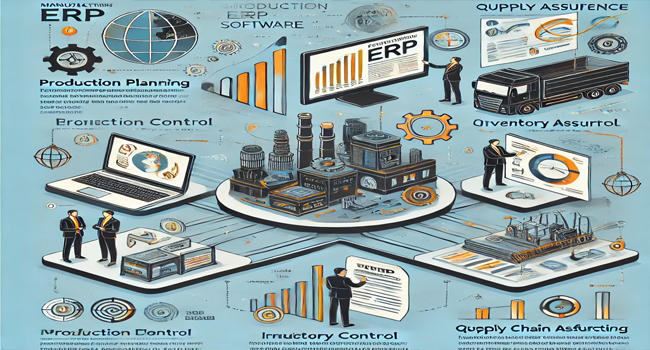Manufacturing ERP Software Companies: A Comprehensive Guide
Manufacturing ERP (Enterprise Resource Planning) software companies play a critical role in helping manufacturers optimize operations, enhance productivity, and drive business growth. These software solutions integrate core business processes such as production planning, inventory management, supply chain coordination, and financial tracking into a unified system. With the rapid advancements in technology, ERP solutions have become indispensable for modern manufacturing enterprises.
This article provides an in-depth look at Manufacturing ERP software companies, highlighting their significance, key players, essential features, benefits, challenges, and future trends.
Importance of Manufacturing ERP Software
Manufacturing ERP software is designed to streamline complex operations by automating and integrating various business functions. It helps manufacturers to:
- Improve production planning and scheduling.
- Enhance inventory and supply chain management.
- Reduce operational costs and waste.
- Increase efficiency and productivity.
- Ensure regulatory compliance and quality control.
- Optimize resource allocation and utilization.
- Provide real-time insights for decision-making.
Key Features of Manufacturing ERP Software
Modern Manufacturing ERP solutions offer a range of features that enhance operational efficiency. Some of the essential features include:
- Production Planning and Scheduling: Helps manufacturers optimize production processes by aligning them with demand forecasts.
- Inventory Management: Tracks stock levels, automates reordering, and prevents overstocking or stockouts.
- Supply Chain Management: Ensures seamless coordination with suppliers, vendors, and distributors.
- Quality Control: Monitors product quality at different stages of production.
- Financial Management: Includes accounting, budgeting, and financial reporting.
- Customer Relationship Management (CRM): Helps manage customer interactions, orders, and feedback.
- Human Resource Management (HRM): Handles workforce management, payroll, and compliance.
- Business Intelligence & Analytics: Provides data-driven insights through reporting and dashboards.
- Integration & Scalability: Seamlessly integrates with third-party applications and scales with business growth.
- Compliance and Risk Management: Ensures adherence to industry regulations and safety standards.
Top Manufacturing ERP Software Companies
Here is a detailed table showcasing some of the top Manufacturing ERP software companies, their headquarters, key features, and industries served:
| Company | Headquarters | Key Features | Industries Served |
|---|---|---|---|
| SAP ERP | Germany | Advanced analytics, AI-driven automation, supply chain management | Automotive, Aerospace, Chemicals, Electronics |
| Oracle NetSuite | USA | Cloud-based ERP, financial management, production tracking | Food & Beverage, Apparel, Pharmaceuticals, Consumer Goods |
| Microsoft Dynamics 365 | USA | AI-powered insights, production planning, demand forecasting | Manufacturing, Retail, Healthcare, Construction |
| Infor CloudSuite | USA | AI-driven automation, supply chain visibility, financial tracking | Automotive, Aerospace, Industrial Equipment |
| Epicor ERP | USA | Customizable dashboards, material requirements planning, warehouse management | Electronics, Metal Fabrication, Medical Devices |
| Plex Systems | USA | Cloud-based smart manufacturing, IoT integration, real-time analytics | Automotive, Food & Beverage, Aerospace |
| SYSPRO | South Africa | Multi-level BOM, AI-driven automation, compliance tracking | Industrial Machinery, Electronics, Packaging |
| IFS ERP | Sweden | Advanced production control, asset management, real-time monitoring | Aerospace, Energy, Defense, Manufacturing |
| Acumatica | USA | Cloud ERP, financial planning, CRM integration | Small & Medium Manufacturing Businesses |
| QAD ERP | USA | Lean manufacturing, supplier management, AI-powered analytics | Automotive, Life Sciences, Consumer Products |
Benefits of Using Manufacturing ERP Software
1. Enhanced Efficiency & Productivity
ERP systems automate routine tasks, reducing manual errors and improving overall efficiency.
2. Real-Time Data Access
Manufacturers can access up-to-date information, making data-driven decisions easier.
3. Cost Reduction
Optimized resource allocation and reduced waste help lower operational costs.
4. Improved Collaboration
Seamless communication between departments enhances coordination and teamwork.
5. Scalability & Flexibility
ERP solutions grow with the business, allowing easy expansion and integration of new modules.
6. Regulatory Compliance
Built-in compliance features ensure adherence to industry regulations and safety standards.
7. Better Customer Satisfaction
Efficient production and timely deliveries enhance customer experience.
Challenges of Implementing ERP in Manufacturing
While ERP solutions offer numerous benefits, their implementation comes with challenges:
- High Initial Cost: ERP systems require significant investment in software, hardware, and training.
- Complex Implementation Process: Integrating ERP into existing workflows can be time-consuming and require expert guidance.
- Resistance to Change: Employees may be hesitant to adopt new technologies and workflows.
- Data Migration Issues: Transferring existing data into the ERP system can be challenging.
- Customization Complexity: Adapting ERP to specific manufacturing needs may require additional development work.
Future Trends in Manufacturing ERP Software
1. AI & Machine Learning Integration
ERP systems will leverage AI to improve automation, predictive maintenance, and demand forecasting.
2. Cloud-Based ERP Solutions
More manufacturers are adopting cloud-based ERP for flexibility, scalability, and cost savings.
3. IoT and Smart Manufacturing
Integration with IoT will provide real-time monitoring of machines, supply chains, and production lines.
4. Blockchain for Supply Chain Transparency
Blockchain technology will enhance security, transparency, and traceability in supply chain management.
5. Mobile & Remote ERP Access
With the rise of remote work, ERP solutions are becoming mobile-friendly for real-time monitoring from anywhere.
Conclusion
Manufacturing ERP software companies are transforming the manufacturing sector by providing innovative solutions that enhance efficiency, optimize resource utilization, and improve decision-making. While implementing ERP systems may come with challenges, the long-term benefits significantly outweigh the initial investment. As technology continues to evolve, ERP solutions will become even more intelligent, connected, and adaptable, driving the future of smart manufacturing.
Choosing the right ERP software depends on factors such as business size, industry requirements, and scalability needs. By investing in a robust ERP system, manufacturers can streamline operations and stay competitive in an ever-changing market.
